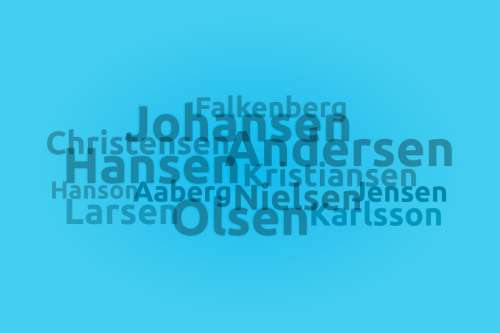The region of northern Europe made up of Sweden, Norway, and Denmark is called Scandinavia. These three countries are also part of a larger group called the Nordic countries that includes Finland, Denmark, Norway, Sweden, and Iceland. The Scandinavian languages include Swedish, Norwegian, Danish, Icelandic, and Faroese.
The history of Scandinavian people can be traced back to the Vikings. The Vikings, also called Norsemen, were well-known sea-faring people with a reputation for raiding and pirating throughout Europe and Asia. They most often practiced Norse Mythology. In modern times, Norse Gods such as Odin, Thor, Freya, and Loki have become well-known figures in pop culture thanks to Marvel's Thor movies.
The Scandinavian region is famous for its breathtaking landscapes including fjords, mountains, and beautiful beaches. The naming customs in Scandinavia also have their own fascinating history.
The Origin of Scandinavian Last Names
Like other regions throughout the world, Scandinavia was late to adopt surnames. Once those countries did, they were used in conjunction with patronyms.
Scandinavian names follow specific naming patterns. Family names are often passed down generations. Most surnames follow the practice of patronyms that incorporate a person's father's name. Patronymic names use the father's given name plus a suffix at the end to indicate relationship. Therefore, their baby names indicate relationships and a sense of community.
Scandinavian last names typically end in -sen or sson meaning "son" or -datter or -dotter, meaning daughter. For example, Bengtsson is Swedish surname that translates to "son of Bengt." Scandinavians are also known for re-using several of the most popular first names and last names, so it's not uncommon to come across many people with identical names in this region. Currently, over two-thirds of the Danish population have a surname ending in -sen!
Common Scandinavian Surnames (and Meanings)

These Scandinavian surnames, commonly found across Norway, Denmark, and Sweden, tell a story of the people’s affinity with nature, their ancestral lineage, and the professions that defined their way of life. This section explores the most popular Scandinavian last names, shining a light on their origins and the stories they carry through the generations.
- Andersen - A Danish-Norwegian patronymic surname meaning "son of Anders."
- Christensen (or Kristiansen) - A name derived from Danish origins, meaning "son of Christen/Christian."
- Hansen - Meaning "son of Hans."
- Jacobsen - Meaning "son of Jacob."
- Jensen - An extremely popular Danish surname meaning "son of Jens." Today, Jensen is also a popular first name for boys.
- Johansen - Meaning "son of John."
- Karlsson - A patronymic surname meaning "son of Karl." Karlsson is one of the most common surnames in Sweden.
- Larsen - A Danish and Norwegian patronymic from "son of Lars." Lars is the Scandinavian equivalent of the Latin first name Lawrence.
- Nielsen - A Danish patronymic surname meaning "son of Niels."
- Olsen - Derived from Old Norse, meaning "son of Olaf."
Most Popular Scandinavian Last Names
Behind every Scandinavian surname is a narrative waiting to be uncovered. From picturesque natural phenomena to ancient gods, the meanings of these last names weave a tapestry of cultural and historical significances.
- Aaberg - Meaning "river."
- Abel - A Biblical name.
- Ahlgren - Means "older branch."
- Berg - Meaning "mountain" or "hill."
- Dahl - Meaning "valley."
- Falkenberg - Derived from Germanic origins, combining falken meaning "falcon" and berg meaning "mountain" or "hill".
- Holm - Meaning "island."
- Iversen - Derived from the given name Iver.
- Vik - Meaning "bay" or "inlet."
- Wulff - Derived from the Old German surname "Wolf."
Nordic Last Names
Nordic last names, also known as Scandinavian surnames, can originate from a variety of sources including nature, geography, and ancestral professions or characteristics. Names ending in -son or -sen (such as Johansson or Andersen) signify "son of", reflecting the paternal lineage. Other common themes include names derived from the natural world, like Lindberg ("linden tree mountain") or Dahl ("valley"). Occupations also play a role, with names like Smed ("smith") indicating ancestral trades.

